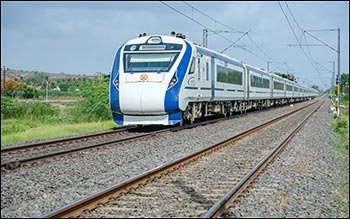The Vande Bharat Express, which is expected to start operations from New Delhi to Kashmir in January 2025, is poised to become a game-changer for the region’s connectivity and economy. This much-awaited service, part of the Udhampur-Srinagar-Baramulla Rail Link (USBRL), will directly connect Kashmir to the national capital, providing a critical boost to regional development.
As the project nears completion, with 255 kilometres of the 272-kilometre stretch already operational, the region stands on the cusp of a transformative journey. The final 17 kilometres, which include a crucial stretch between Katra and Reasi, are set to be completed by December, paving the way for the inauguration. The Vande Bharat Express will not only traverse the iconic Chenab Rail Bridge, the world’s highest railway bridge but also mark a monumental achievement in Indian engineering. Railway Minister of State, who recently visited the project site, emphasised the importance of safety and thorough inspections before the inauguration. The train will significantly reduce travel times between Delhi and Kashmir, offering much-needed respite to local communities, especially during winter months when the region’s highways are often blocked by snow. Singh highlighted that the project, which had stalled previously, has seen accelerated work over the past eight years, with dedicated efforts from engineers, technical teams, and workers.
The train service will also bring about a substantial economic boost for Kashmir. With ticket prices ranging from Rs 1,500 to Rs 2,100, it will not only cater to the local population but also attract tourists, bolstering the region’s tourism industry. The service will also facilitate the swift transport of perishable goods such as fruits and vegetables, further benefiting local businesses and increasing the reach of Kashmiri products in national markets. The Vande Bharat Express represents a shift in the economic and social landscape of the region. It is a symbol of resilience, the result of overcoming complex geographical and logistical challenges. The project’s sustainability, however, raises pertinent concerns. While the faster transport of goods and people can significantly improve the region’s economy, the environmental impact of large-scale infrastructure development, especially in a fragile ecosystem like Kashmir, warrants attention. Sustainable construction practices and eco-friendly solutions will be critical in ensuring that this transformative project leaves a positive legacy for future generations. The Vande Bharat service is much more than just a railway project. It is a beacon of hope for Kashmir, offering connectivity, economic growth, and a bridge to a brighter future for the people of the region.


